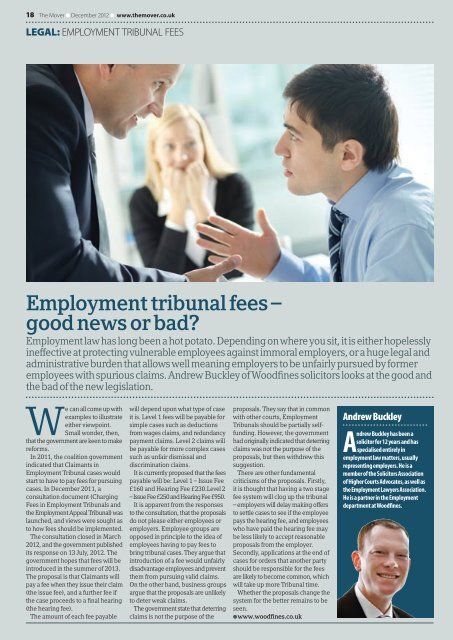18 <strong>The</strong> <strong>Mover</strong> ● <strong>December</strong> <strong>2012</strong> ● www.themover.co.ukLEGAL: EMPLOYMENT TRIBUNAL FEESEmployment tribunal fees –good news or bad?Employment law has long been a hot potato. Depending on where you sit, it is either hopelesslyineffective at protecting vulnerable employees against immoral employers, or a huge legal andadministrative burden that allows well meaning employers to be unfairly pursued by formeremployees with spurious claims. Andrew Buckley of Woodfines solicitors looks at the good andthe bad of the new legislation.We can all come up withexamples to illustrateeither viewpoint.Small wonder, then,that the government are keen to makereforms.In 2011, the coalition governmentindicated that Claimants inEmployment Tribunal cases wouldstart to have to pay fees for pursuingcases. In <strong>December</strong> 2011, aconsultation document (ChargingFees in Employment Tribunals andthe Employment Appeal Tribunal) waslaunched, and views were sought asto how fees should be implemented.<strong>The</strong> consultation closed in March<strong>2012</strong>, and the government publishedits response on 13 July, <strong>2012</strong>. <strong>The</strong>government hopes that fees will beintroduced in the summer of 2013.<strong>The</strong> proposal is that Claimants willpay a fee when they issue their claim(the issue fee), and a further fee ifthe case proceeds to a final hearing(the hearing fee).<strong>The</strong> amount of each fee payablewill depend upon what type of caseit is. Level 1 fees will be payable forsimple cases such as deductionsfrom wages claims, and redundancypayment claims. Level 2 claims willbe payable for more complex casessuch as unfair dismissal anddiscrimination claims.It is currently proposed that the feespayable will be: Level 1 – Issue Fee£160 and Hearing Fee £230.Level 2– Issue Fee £250 and Hearing Fee £950.It is apparent from the responsesto the consultation, that the proposalsdo not please either employees oremployers. Employee groups areopposed in principle to the idea ofemployees having to pay fees tobring tribunal cases. <strong>The</strong>y argue thatintroduction of a fee would unfairlydisadvantage employees and preventthem from pursuing valid claims.On the other hand, business groupsargue that the proposals are unlikelyto deter weak claims.<strong>The</strong> government state that deterringclaims is not the purpose of theproposals. <strong>The</strong>y say that in commonwith other courts, EmploymentTribunals should be partially selffunding.However, the governmenthad originally indicated that deterringclaims was not the purpose of theproposals, but then withdrew thissuggestion.<strong>The</strong>re are other fundamentalcriticisms of the proposals. Firstly,it is thought that having a two stagefee system will clog up the tribunal– employers will delay making offersto settle cases to see if the employeepays the hearing fee, and employeeswho have paid the hearing fee maybe less likely to accept reasonableproposals from the employer.Secondly, applications at the end ofcases for orders that another partyshould be responsible for the feesare likely to become common, whichwill take up more Tribunal time.Whether the proposals change thesystem for the better remains to beseen.● www.woodfines.co.ukAndrew BuckleyAndrew Buckley has been asolicitor for 12 years and hasspecialised entirely inemployment law matters, usuallyrepresenting employers. He is amember of the Solicitors Associationof Higher Courts Advocates, as well asthe Employment Lawyers Association.He is a partner in the Employmentdepartment at Woodfines.
www.themover.co.uk ● <strong>December</strong> <strong>2012</strong> ● <strong>The</strong> <strong>Mover</strong> 19NEWS: INTERNATIONALGoods vehicles must pay touse French roads from 2013From July 2013 goods vehicles over 3.5 tonnes travelling in France will becharged a tax to use large sections of the national and local road network.● Vehicles travelling to European countries have little choice but to pass through France.<strong>The</strong> Heavy Goods Vehicle Eco-Tax will apply to 15,000kmof French roads but will notinclude toll motorways.<strong>The</strong> new Eco-Tax will be calculatedby applying a kilometre rate thatvaries according to the type of vehicleinvolved, its emission levels and thearea of the country concerned. It isestimated the tax will raise 1.2 billioneuros per annum and - according tothe French government - will be usedto finance transport infrastructureprojects and support sustainabledevelopment.Tax will be collected by an onboardunit (OBU) fitted to the insideof the vehicle’s windscreen. <strong>The</strong>device will be configured to applythe correct rate of tax at the time ofregistration based on the vehicle’scharacteristics and will be triggeredby GPS satellite technology. It willbe the operator’s responsibility toinstall the unit and to register witha Registered Electronic Toll SystemCompany (SHT) who will invoicethe operator on a monthly basis.Alternative pre-payment methods willalso be available whereby operatorsbuy credits using a credit or fuelcard. <strong>The</strong> tax will be deductedautomatically from the balanceduring the journey and can be recreditedvia a 24-hour multi-lingualcall centre or via the Internet.<strong>The</strong> actual rates of tax have not yetbeen announced however a websitewill be available from January nextyear that will enable operators tocalculate the tax due for any particularjourney in advance.<strong>The</strong> customermust payThis new, somewhat cynically namedEco-Tax is another unwelcomemove to make vehicle operatorsfork out even more of their already slimmargins to the tax man. France is a bigcountry and vehicles travelling to otherparts of continental Europe have littleoption but to pass through it on theirway to and from their destinations.As yet the French authorities have notannounced the level of tax they intendto impose, but whatever it is it must notbe allowed to impact on the profits ofremovals companies operating on theaffected routes. Careful calculationswill need to be made to establish howmuch the new tax will add to a journeyand the price to the customer must beset accordingly. Attempting to absorbthe tax will result in more removalscompanies struggling to survive and adiminished service to Europe.Enforcement<strong>The</strong> designers of the charging system,Ecomouv have installed a numberof fixed automatic enforcementcheckpoints located across France.Information collected by thesedevices will also be passed to StateEnforcement Agents responsiblefor policing the taxable network.● More information about theforthcoming French Heavy GoodsVehicle Eco-Tax is available atwww.ecomouv.com.FRENCH POSTPONEFINES FOR NOTCARRYING ABREATHALYSERFines for drivers of allmotor vehicles - includingmotorcyclists - who are caughtwithout a breathalyser kit, willbe implemented in Francefrom March 2013, accordingto the Institute of AdvancedMotorists (IAM). <strong>The</strong> fineswere due to be enforced from1 November, <strong>2012</strong>.All drivers in France are nowrequired to carry a breathalyserkit and a euro 11 fine will beapplicable to all road users, exceptriders of mopeds, who do not comply.Single-use breathalyser kits willsatisfy the requirement. <strong>The</strong> legallimit in France is 50mg per 100ml ofblood, lower than in the UK (the UKlimit is 80mg). <strong>The</strong>y cost between £1and £2 and are available at ferry andtunnel terminals for crossings toFrance. <strong>The</strong> French authorities hopethe move will encourage drivers totest themselves to check if they areover the drink-drive limit beforesetting out.Anyone driving in France is alreadyrequired to carry a warning triangleand a fluorescent safety vest to use inan emergency. Additionally UKmotorists and motorcyclists mustdisplay a GB plate.IAM Director of Policy and ResearchNeil Greig said: “<strong>The</strong> new French rule isa genuine attempt to reduce the numberof alcohol-related accidents. France’slower limit means it’s very easy to beover the limit the morning after as well.As always, the best advice for roadusers is not to drink and drive at all.”EUROMOVERS InternationalWorldwide <strong>Mover</strong>s AllicanceA friendly Networkwith a Family SpiritEUROMOVERS International SA13, Rue Edmond Reuter · L-5326 Contern, LuxembourgPhone: +352-26 70 16 56 · Fax: +352-26 70 16 57<strong>The</strong> EUROMOVERS Network, now in existence for over10 years, is proud to count partners in more than 30countries in Europe and Overseas.Throughout the years, the network has developed astrong, international recognized partnership. Originallycreated by likeminded European <strong>Mover</strong>s who wished toco-operate with others under the same standards, visionand banner, it has developed to an exclusive Circle ofExperts with strong coherence, co-operating with afamily spirit.Email: info@euromovers.comWeb: www.euromovers.comRecognized TrademarkCo-operation and AssistanceSpecial rates and ConditionsPowerlanes and Groupage ServicesExchange of Knowledge and ExperienceParticipate in Corporate AccountsHO's Sales AssistancePartner-to-Partner Sales AssistanceMarketing, Public Relations, WebQuality Training EnvironmentInternational Matrix CertificationArea Coverage



